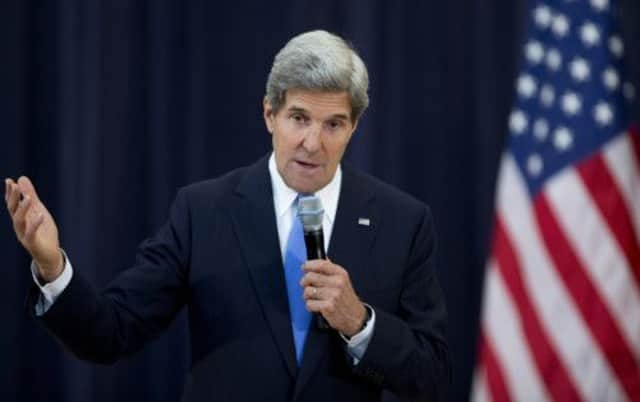Nine months for peace in the Middle East, says US


Senior aides to Israeli prime minister Benjamin Netanyahu and Palestinian president Mahmoud Abbas held their first talks this week since 2010, focussing largely on the framework for negotiations.
Speaking last night after the meetings, which included a session with US president Barack Obama and vice-president Joe Biden, as well as direct talks between the two sides without US officials present, Mr Kerry said he believed peace was possible despite the obstacles.
Advertisement
Hide AdAdvertisement
Hide Ad“I am pleased to report that in the conversations we have had last night and again today, we have had constructive and positive meetings,” he said, flanked by Israeli justice minister Tzipi Livni and Palestinian chief negotiator Saeb Erekat.
Mr Kerry added: “I know the path is difficult. There is no shortage of passionate sceptics. But with capable, respected negotiators … I am convinced that we can get there.
“All of the core issues, and all other issues, are all on the table for negotiation.”
Mr Kerry, who has prodded, coaxed and cajoled the two sides to resume negotiations in a flurry of visits to the Middle East during his less than six months in office, has urged Israelis and Palestinians to strike “reasonable compromises”.
The US is seeking to broker an agreement on a “two-state solution”, in which Israel would exist peacefully alongside a new Palestinian state created in the West Bank and the Gaza Strip, lands occupied by the Israelis since a 1967 war. The major issues to be resolved include borders, the future of Jewish settlements in the West Bank, the fate of Palestinian refugees and the status of Jerusalem.
Mr Kerry said the negotiations – to be mediated on a day-to-day basis by his new peace envoy, Martin Indyk – would be cloaked in secrecy and that the parties had agreed he would be the only person to comment on them. But Mr Kerry then added he would not comment on them, leaving unclear the framework for the talks he struggled for six months to get back on track.
Despite the secrecy, the broad outlines of an agreement are well known: the Palestinians want a state based on the lines, with land swaps, that existed before the 1967 war in which Israel seized east Jerusalem and occupied the West Bank and Gaza. Israel wants security assurances and a recognition that it is and will remain a Jewish state.
Mr Obama laid out those parameters as US policy for any negotiations in a May 2010 speech, but neither the Israelis nor the Palestinians has publicly signed off on them. US officials yesterday said the talks would proceed under the framework Mr Obama announced in that speech, but Mr Kerry did not mention that in his comments.
Advertisement
Hide AdAdvertisement
Hide AdInstead, he said only that the two sides had agreed that all “final status issues, all of the core issues and all other issues” would be on the table for negotiation.
“It’s time for the Palestinian people to have an independent sovereign state of their own,” said Mr Erekat. “It’s time for the Palestinians to live in peace, freedom and dignity in their own independent, sovereign state.”
Ms Livni allowed that she and Mr Erekat had been involved in failed negotiations before, but said this time could be different.
She said: “The opportunity has been created for us, for all of us, and we cannot afford to waste it.
“I believe that history is not made by cynics; it is made by realists who are not afraid to dream. Let us be these people.”
SEE ALSO: